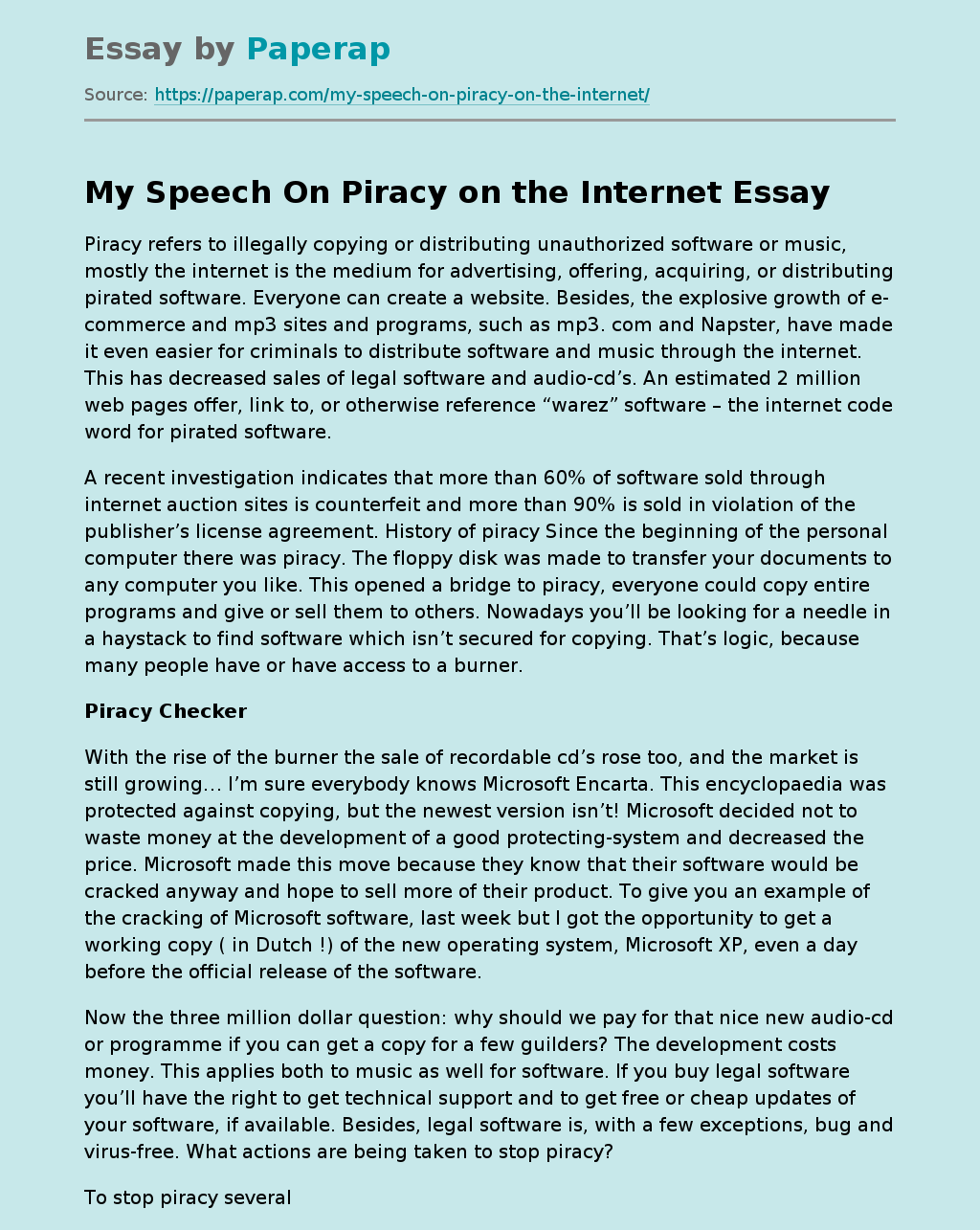My Speech On Piracy on the Internet
Piracy refers to illegally copying or distributing unauthorized software or music, mostly the internet is the medium for advertising, offering, acquiring, or distributing pirated software. Everyone can create a website. Besides, the explosive growth of e-commerce and mp3 sites and programs, such as mp3. com and Napster, have made it even easier for criminals to distribute software and music through the internet. This has decreased sales of legal software and audio-cd’s. An estimated 2 million web pages offer, link to, or otherwise reference “warez” software – the internet code word for pirated software.
A recent investigation indicates that more than 60% of software sold through internet auction sites is counterfeit and more than 90% is sold in violation of the publisher’s license agreement. History of piracy Since the beginning of the personal computer there was piracy. The floppy disk was made to transfer your documents to any computer you like. This opened a bridge to piracy, everyone could copy entire programs and give or sell them to others.
Nowadays you’ll be looking for a needle in a haystack to find software which isn’t secured for copying. That’s logic, because many people have or have access to a burner.
Piracy Checker
With the rise of the burner the sale of recordable cd’s rose too, and the market is still growing… I’m sure everybody knows Microsoft Encarta. This encyclopaedia was protected against copying, but the newest version isn’t! Microsoft decided not to waste money at the development of a good protecting-system and decreased the price.
Microsoft made this move because they know that their software would be cracked anyway and hope to sell more of their product. To give you an example of the cracking of Microsoft software, last week but I got the opportunity to get a working copy ( in Dutch !) of the new operating system, Microsoft XP, even a day before the official release of the software.
Now the three million dollar question: why should we pay for that nice new audio-cd or programme if you can get a copy for a few guilders? The development costs money. This applies both to music as well for software. If you buy legal software you’ll have the right to get technical support and to get free or cheap updates of your software, if available. Besides, legal software is, with a few exceptions, bug and virus-free. What actions are being taken to stop piracy?
To stop piracy several organisations were set up, such as the Dutch Buma/Stemra and the BSA. The Buma/Stemra cooperates with the Public Prosecutor, the police and other Criminal Investigation Departments. Buma/Stemra is an organisation which tries to find the illegal music sources and prosecutes them. In the worst case you can put in prison for a maximum of four years and fine hundreds of thousands of guilders. The BSA, Business Software Alliance, is the world ‘s leading organisation dealing with the use of illegal software.
The BSA busted the illegal software-collection-cd-rom Twilight nearly three years ago, but after a short period of inactivity Twilight is still up and running. BSA has approximately 65 hotlines around the world for callers who seek information about or wish to report piracy. The BSA set up hundreds of criminal cases, closed down pirate internet sites, stops the illegal sale of pirated software through the internet and seizes illegal cd presses. All money collected from settlements is used to fund the organization’s education and enforcement programs.
My opinion about piracy. I think piracy is the direct result of the high prices. But not only that, the PlayStation became so popular because you have the opportunity to copy the cd-roms. Some people, including me, think that Sony on purpose created the possibility to copy them to get a high profit of the machines. There is a slight chance piracy can be stopped, because you can’t check everything anywhere. If the prices of legal software and updates decrease a lot people would buy more legal and less illegal software.
My Speech On Piracy on the Internet. (2019, Dec 05). Retrieved from https://paperap.com/my-speech-on-piracy-on-the-internet/

